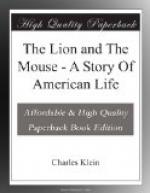“On page 22 you call him ’the world’s greatest individualized potentiality, a giant combination of materiality, mentality and money—the greatest exemplar of individual human will in existence to-day.’ And you make indomitable will and energy the keystone of his marvellous success. Am I right?” He looked at her questioningly.
“Quite right,” answered Shirley.
Ryder proceeded:
“On page 26 you say ’the machinery of his money-making mind typifies the laws of perpetual unrest. It must go on, relentlessly, resistlessly, ruthlessly making money-making money and continuing to make money. It cannot stop until the machinery crumbles.’”
Laying the book down and turning sharply on Shirley, he asked her bluntly:
“Do you mean to say that I couldn’t stop to-morrow if I wanted to?”
She affected to not understand him.
“You?” she inquired in a tone of surprise.
“Well—it’s a natural question,” stammered Ryder, with a nervous little laugh; “every man sees himself in the hero of a novel just as every woman sees herself in the heroine. We’re all heroes and heroines in our own eyes. But tell me what’s your private opinion of this man. You drew the character. What do you think of him as a type, how would you classify him?”
“As the greatest criminal the world has yet produced,” replied Shirley without a moment’s hesitation.
The financier looked at the girl in unfeigned astonishment.
“Criminal?” he echoed.
“Yes, criminal,” repeated Shirley decisively. “He is avarice, egotism, and ambition incarnate. He loves money because he loves power, and he loves power more than his fellow man.”
Ryder laughed uneasily. Decidedly, this girl had opinions of her own which she was not backward to express.
“Isn’t that rather strong?” he asked.
“I don’t think so,” replied Shirley. Then quickly she asked: “But what does it matter? No such man exists.”
“No, of course not,” said Ryder, and he relapsed into silence.
Yet while he said nothing, the plutocrat was watching his visitor closely from under his thick eyebrows. She seemed supremely unconscious of his scrutiny. Her aristocratic, thoughtful face gave no sign that any ulterior motive had actuated her evidently very hostile attitude against him. That he was in her mind when she drew the character of John Broderick there was no doubt possible. No matter how she might evade the identification, he was convinced he was the hero of her book. Why had she attacked him so bitterly? At first, it occurred to him that blackmail might be her object; she might be going to ask for money as the price of future silence. Yet it needed but a glance at her refined and modest demeanour to dispel that idea as absurd. Then he remembered, too, that it was not she who had sought this interview, but himself. No, she was no blackmailer.




